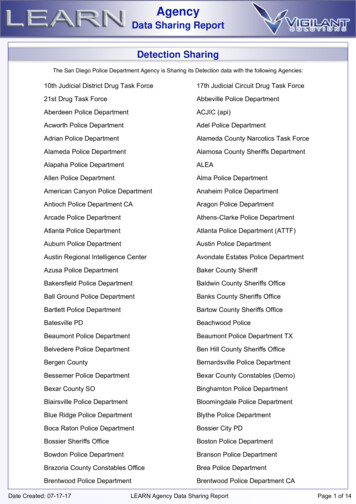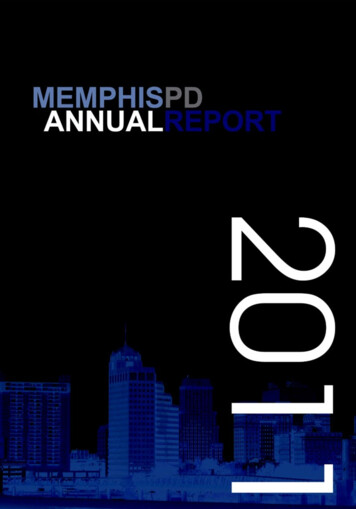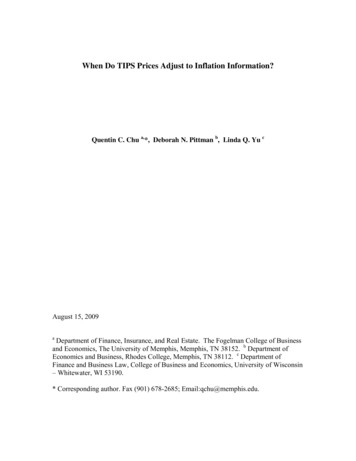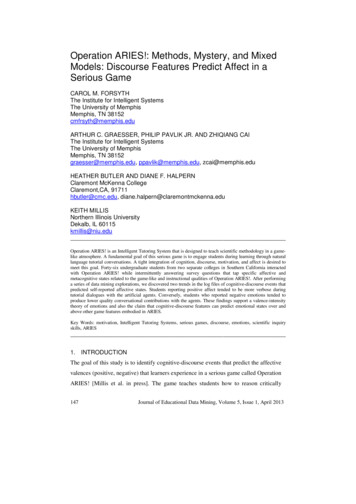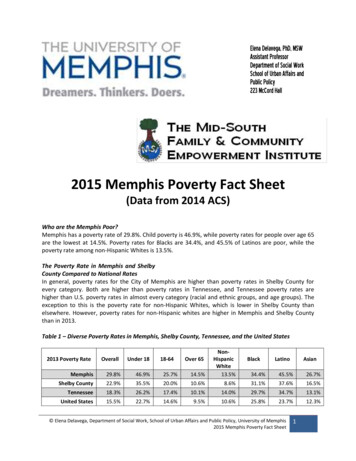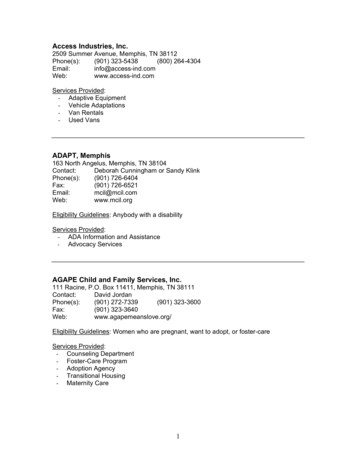
Transcription
MEMPHIS POLICE DEPARTMENT POLICY AND PROCEDURESSECTION: OrganizationMemphis Police DepartmentMission StatementOur Purpose is to create and maintain public safety in the City of Memphis. We do so withfocused attention on preventing and reducing crime, enforcing the law, and apprehendingcriminals.VisionTo create and maintain for the City of Memphis an environment of public safety recognized forits intolerance for crime and its compassion and responsiveness to the needs, rights, andexpectations of all citizens, employees and visitors.ValuesHonesty Excellence Integrity Leadership Dignity and RespectRecognition and Reward Personal Responsibility Individual AccountabilityContinuous Learning Clarity of ExpectationsEvery organization requires its own internal procedure for conveying information andinstructions, as well as establishing rules and regulations governing employee performance. Themost effective method for an agency of our size is to compile relatively permanent material intoa single source manual and to supplement that manual when changes in procedure are necessary.This Policy and Procedure Manual has been established to meet these needs.The material in this manual governs the action of all departmental personnel. However, it mustbe remembered that due to the nature of police work, emergency situations may arise that requirea temporary deviation from standard policies and procedures. Therefore, operational procedurescontained in this manual may temporarily be superseded by an order of the Director of PoliceServices when necessary.Date: 08-27-18Section 1: OrganizationChapter IPage 1
MEMPHIS POLICE DEPARTMENT POLICY AND PROCEDURESSECTION: OrganizationOrganizationDepartmental Directives and Communications .14Special Order/ Information Bulletin.14Intelligence/Training/Personnel Bulletin .14Standard Operating Procedures .15Policy and Procedure Manual and Updates.15Communication .16Equal Opportunity Employment Policy Statement .16Organizational Functions, Command Authority and Rank Structure .7Organizational Functions .7MPD Acronyms and Unit Names .10Command Authority .10Rank Structure .11Regulations Establishing the Duties of Members .12Director .12Supervisory Members .12Sworn Members .13Civilian Members .14Regulations for the Governance of the Police Department .3Service to the Community .3Standards of Conduct .3Regulations Establishing the Goals of the Department .6Regulations Establishing the Goals of Department Members .6Use of Discretion by Department Personnel .7I. Regulations for the Governance of the Police DepartmentDate: 08-27-18Section 1: OrganizationChapter IPage 2
MEMPHIS POLICE DEPARTMENT POLICY AND PROCEDURESSECTION: OrganizationA. Service to the CommunityThe Memphis Police Department has the primary responsibility of providing complete lawenforcement services to the City of Memphis. The Memphis Police Department will respondto all calls for service within the City of Memphis and will enforce all Memphis CityOrdinance Codes. MPD officers will investigate and enforce all violations of TennesseeCode Annotated laws, traffic and criminal, within the City of Memphis.Within the confines of the Memphis city limits, the Memphis Police Department hasconcurrent jurisdiction with the Shelby County Sheriff's Department, and with various stateand federal law enforcement agencies. These agencies have legal authority to performparticular police functions within the City of Memphis. The origin of their office (federal,state, etc.) defines the scope of their authority. Since these organizations share the sameprimary objective, they may from time to time request assistance from the Memphis PoliceDepartment. (2.1.2)The Memphis Police Department serves the citizens of the City of Memphis by performingthe law enforcement function in a professional manner, and it is to these citizens that it isultimately responsible. The Department protects the rights of all persons within itsjurisdiction to be free from criminal attack, to be secure in their possessions and to live inpeace.A large urban society free from crime and disorder remains an unachieved ideal;nevertheless, consistent with the values of a free society, it is the primary objective of theMemphis Police Department to, as closely as possible, approach that ideal. In doing so, theDepartment's role is to enforce the law in a fair and impartial manner, recognizing both thestatutory and judicial limitations of police authority and the constitutional rights of allpersons.The Memphis Police Department recognizes that diversion programs are effectivealternatives available to the criminal justice process and will support and assist interventionprogram administrators, courts and solicitors through funding and/or participation inaccordance with State and Federal guidelines.These programs include but are not limited to:(1.1.3)Shelby County Drug Court where the department provides funding; andShelby County Community Service Work Program where the department providescommunity service worksites.B. Standards of Conduct:1. All non-sworn, civilian personnel of the Memphis Police Department shall abide by thefollowing Civilian Code of Ethics:“As an employee of the Memphis Police Department, I regard myself as a member of animportant and honorable profession. As such, I will not, in the performance of my duties,work for unethical advantage or personal profit and I shall: Perform my duties with efficiency to the best of my ability. Be truthful at all times. My conduct and performance of duties will be accomplishedin an honest manner, and in compliance with the laws; local, county, state, andDate: 08-27-18Chapter ISection 1: OrganizationPage 3
MEMPHIS POLICE DEPARTMENT POLICY AND PROCEDURESSECTION: Organization country.Adhere to the confidentiality of the Law Enforcement profession.Recognize at all times that I am a public safety employee, and that ultimately I amresponsible to the public.Give the most efficient and impartial service of which I am capable at all times.Be courteous in all my contacts at all times.Regard my fellow employees with equality, dignity, and respect.Be loyal to my fellow employees, my superiors and the Memphis Police Department.Accept responsibility for my actions.Strive to do only those things that will reflect honor on my fellow employees, myself,and the Memphis Police Department”2. All sworn members of the Memphis Police Department will abide by the standards ofconduct set forth in the Law Enforcement Code of Ethics (1.1.2):"As a law enforcement officer, my fundamental duty is to serve mankind; to safeguardlives and property, to protect the innocent against deception, the weak against oppressionor intimidation, and the peaceful against violence or disorder; and to respect theConstitutional rights of all persons to liberty, equality and justice.I will keep my private life unsullied as an example to all; maintain courageous calm inthe face of danger, scorn, or ridicule; develop self-restraint; and be constantly mindful ofthe welfare of others. Honest in thought and deed in both my personal and official life. Iwill be exemplary in obeying the laws of the land and the regulations of my department.Whatever I see or hear of a confidential nature or that is confided to me in my officialcapacity will be kept ever secret unless revelation is necessary in the performance of myduty. I will never act officiously or permit personal feelings, prejudices, animosities, orfriendships to influence my decisions. With no compromise for crime and with relentlessprosecution of criminals, I will enforce the law courteously and appropriately withoutfear or favor, malice or ill will, never employing unnecessary force or violence and neveraccepting gratuities.I recognize the badge of my office as a symbol of public faith, and accept it as a publictrust to be held so long as I am true to the ethics of the police service. I will constantlystrive to achieve these objectives and ideals, dedicating myself before God to my chosenprofession . law enforcement."Police officers are frequently required to make decisions affecting human life and libertyin difficult situations where there is little or no opportunity to seek advice and little timefor reflection.Law enforcement, therefore, requires an officer to have the stamina, intelligence, moralcourage and emotional stability necessary to fairly and impartially deal with humanbeings in the many complicated and potentially explosive situations, which heencounters.Date: 08-27-18Section 1: OrganizationChapter IPage 4
MEMPHIS POLICE DEPARTMENT POLICY AND PROCEDURESSECTION: OrganizationThe public demands that the integrity of its law enforcement officers be above reproach,and the dishonesty of a single officer may impair public confidence and cast suspicionand disrespect upon the entire Department. Succumbing to even minor temptation can bethe genesis, which will ultimately destroy an individual's effectiveness and contribute tothe corruption of countless others. A member must scrupulously avoid any conduct,which might compromise the integrity of themselves, their fellow members or theDepartment.A police officer is the most conspicuous representative of government, and to the majorityof the people he is a symbol of stability and authority upon whom they can rely. Anofficer's conduct is closely scrutinized, and when his actions are found to be excessive,unwarranted or unjustified, he and the Department are criticized far more severely thancomparable conduct of persons in other walks of life. Since the conduct of a member, onor off duty, does reflect directly upon the Department, members must at all times conductthemselves in a manner which does not bring discredit to themselves, the Department, orthe City.Effective law enforcement depends upon a high degree of cooperation between theDepartment and the public it serves. The practice of courtesy in all public contactsencourages understanding and appreciation; discourtesy breeds contempt andresistance. The majority of the public are law-abiding citizens who rightfully expect fairand courteous treatment by members of the Department. While the urgency of a givensituation would demand firm action, discourtesy or disrespect shown toward any citizenis indefensible. The practice of courteous and respectful conduct by a member is not amanifestation of weakness; it is, on the contrary, entirely consistent with the firmness andimpartiality that characterizes a professional police officer.Members of the Memphis Police Department are confronted daily with situations wherefirm control must be exercised to affect arrests and protect the public safety. Control isachieved through advice, persuasion, warnings or the use of physical force. While the useof reasonable physical force may be necessary in situations, which cannot be otherwisecontrolled, force may not be resorted to unless other reasonable alternatives have beenexhausted or would clearly be ineffective under the particular circumstances involved.Officers are permitted to use whatever force is reasonable and necessary to protectothers or themselves from bodily harm. The use of excessive and unwarranted force orbrutality will not be tolerated under any circumstances.Recognition of individual dignity is vital in a free system of law. Just as all persons aresubject to the law, all persons have a right to dignified treatment under the law, and theprotection of this right is a duty, which is binding on the Department and each of itsmembers, as any other.Every member must treat each person with respect and he must be constantly mindful thatthe people with whom he is dealing are individuals with human emotions and needs.Such recognition and conduct is not an additional duty imposed to a member's primaryresponsibilities, it is inherent in them. A citizen's encounter with the police can be a veryDate: 08-27-18Section 1: OrganizationChapter IPage 5
MEMPHIS POLICE DEPARTMENT POLICY AND PROCEDURESSECTION: Organizationfrightening experience, and under such circumstances, the risk of misunderstanding isgreat. The minimization of this risk is a challenge intrinsic in every public contact by themembers of this Department. Each member of the Department must strive to establish aclimate where they may perform their sworn duties with the acceptance, understanding,and approval of the public.It is essential that public confidence be maintained in the ability of the Department toinvestigate and properly dispose of complaints against its members. Additionally, theDepartment has the responsibility to seek out and discipline those whose conductdiscredits the Department or impairs its effective operation. The rights of the member, aswell as those of the public, must be conducted fairly, impartially and efficiently, with thetruth as its primary objective.”All personnel shall receive training concerning ethics biennially.C. Regulations Establishing the Goals of the Department:To implement the foregoing regulations of the Memphis Police Department, the followinggoals are hereby established:1. Protection of life and property in the City of Memphis;2. Prevention of crime;3. Preservation of the public peace;4. Enforcement of all laws and ordinances;5. Arrest of law violators and assembling competent evidence of the alleged violation;6. Promotion of respect and cooperation of all citizens for the law and for those sworn toenforce it.D. Regulations Establishing the Goals of Department Members:The goals of Department members that embody and implement the policy of the Departmentare:1. Maintenance of the highest standards of integrity and ethics;2. Excellence in the performance of duty;3. Maintenance of private lives, which inspire respect and admiration and provide anexample for the entire community.In order for members of the Department to fulfill these goals and assist in fulfilling theDepartment's goals, members who wish to make suggestions for improvement maycommunicate their suggestions in writing to the Research and Development Office.E. Use of Discretion by Department PersonnelDiscretion is the power of free decision, or latitude of choice within certain legal bounds.It is unrealistic to expect officers to enforce all laws and ordinances regardless of thecircumstances that are encountered. Instead, officers must make discretionary choices inDate: 08-27-18Section 1: OrganizationChapter IPage 6
MEMPHIS POLICE DEPARTMENT POLICY AND PROCEDURESSECTION: Organizationenforcement action or inaction.Discretion shall be based on the totality of the circumstances and applied consistently.The use of discretion requires that an officer make responsible decisions which arepredicated on good judgment and can withstand scrutiny by the department, otherjurisdictional components of the criminal justice system and the community itself.Consistent and wise use of discretion will do much to preserve good relationships and retainthe confidence of the public. On the contrary, when discretionary power is poorly exercised,the actions may be viewed by the public as favoritism, bias or corruption.Officers will use discretion consistent with the laws that they are charged to enforce, and willnot exercise discretion when certain activities are mandated by statutes, department policy orsupervisory direction. Officers will take enforcement action whenever the criminal actendangers or has the potential to endanger the lives, safety, property and well-being of thepublic. If an officer needs guidance in exercising discretion, the officer should refer to statelaw, city ordinance code, or the MPD Policy and Procedures Manual. If the situation isbeyond the officer's scope of responsibility, the officer should contact a supervisor forassistance. (1.2.7)Nothing in this directive is to be construed as permission to disregard any state law,ordinance or rule and regulation of the department. Each officer will be held accountable fortheir actions in these circumstances.II. Organizational Functions, Command Authority and Rank StructureA. Organizational Functions – The Memphis Police Department utilizes the chain ofcommand principle. Each organizational component is under the direct command of onlyone supervisor. The department’s organizational structure is to be depicted graphically on anorganizational chart, which will be reviewed and updated, as necessary, by the Director. Theorganizational chart is to be posted at each precinct/bureau and is available to all personnel.(11.1.2, 11.2.2)The Memphis Police Department is divided into six (6) branches of management: (11.1.1)1. Executive Branch: The Executive Branch of the Memphis Police Department is theprimary management arm of the organization and is controlled by of the Director ofPolice Services and the Deputy Director. The Executive Branch will handle allfunctions of critical importance to the department, or which have a high communityconcern. The following will report directly to the Director of Police Services:Internal Affairs Directors Executive AssistantsSecurity Squad Deputy Director Finance Administration Media Relations Grants Administration Communications AdministratorInspectional Services2. Administrative Services: The Police Administrative Services Branch consists ofSupport Services and is commanded by the Deputy Chief of Administrative Services.Date: 08-27-18Section 1: OrganizationChapter IPage 7
MEMPHIS POLICE DEPARTMENT POLICY AND PROCEDURESSECTION: OrganizationSupport Services provides all employee services, interacts with the City of Memphis tocoordinate hiring and employee benefits, and coordinates capital projects andpurchases for the department.The following units will report to the Deputy Chief of Administrative Services: Accreditation andResearch Arrest Data Entry Special Projects Central Records Central Supply Communications Terminal AgencyCoordinatorsCompstat/Report CenterFleet/BuildingMaintenanceHealth and SafetyHuman Resources Legal LiaisonPhoto LabProperty and EvidenceRadio MaintenanceSpecial Projects3. Police Information Technology: The Police Information Technology Branch iscommanded by the Deputy Chief of Police Information Technology. InformationTechnology plans and implements projects to introduce the use of new technology intolaw enforcement operating procedures. It also includes Information Systems which isresponsible for providing and maintaining all communication services, police records,and reporting system and provides technical support to maintain these services.The following units will report to the Deputy Chief of Police InformationTechnology: Application Information Systems Real Time CrimeDevelopment SupportCenter (RTCC) Network ManagerCrime Stoppers Crime Stoppers RMS AdministratorCrimeAnalysis Crime Analysis Video Analysis4. Investigative Services: The Investigative Services Branch is a 24-hour operation andhas the responsibility of investigating all felony crimes. It is commanded by the DeputyChief of Investigative Services.The following Bureaus/Units will report to the Deputy Chief of Investigative Services: Child Exploitation COMEC USM Mid-SouthTask ForceFugitive Task Force Joint Terrorism Task Crime SceneForce USS EconomicCrimes Task Force Domestic Violence Quality Assurance Economic Crimes Safe Streets Task Vehicle StorageForce Felony Response Sex Crimes/ Juvenile HomicideAbuse Metro Alarm Office Missing Persons5. Special Operations: The Special Operations Branch is commanded by the DeputyChief of Special Operations. This Branch includes specialized units, which servewithin the Memphis Police Department.Date: 08-27-18Section 1: OrganizationChapter IPage 8
MEMPHIS POLICE DEPARTMENT POLICY AND PROCEDURESSECTION: OrganizationThe following units will report to the Deputy Chief of Special Operations: Air SupportBomb UnitCanine UnitCity Court OfficersCrime Prevention Organized Crime UnitBoxing Gym Harbor Patrol Homeland Security Juvenile CourtOfficers Mounted Patrol O.I.S.ViceCriminal ApprehensionP.S.N.Investigative SupportUnitDestruction TeamComplaint TeamDARE/GREATGang UnitCriminal EnterpriseTeamDEA Task ForceDrug Response Team Reserve DivisionSpecial Events T.A.C.T. Traffic DivisionD.U.I.S.T.I.S.MotorsCivilian Traffic AidePolice ServiceTechnicians Warrant Squad Wrecker CoordinatorThe department is committed to the development and perpetuation of programsdesigned to deter and control juvenile delinquency. The responsibility for participatingin or supporting the agency’s juvenile operational function is shared by all agencycomponents and personnel. (44.1.1.a, b) The department will encourage review andcomment by other elements of the juvenile justice system in the development andimplementation of new policies and procedures relating to juveniles. (44.1.2)6. Uniform Patrol: The Uniform Patrol Branch is a 24-hour operation and is comprisedof two districts, District 1 and District 2. Each District is commanded by its respectiveDeputy Chief. Uniform Patrol is the most visible representative of City government,and is responsible for the delivery of all basic police services, including responding tocalls for assistance.The following work stations comprise Uniform Patrol District I: Mt. Moriah Station/G.I.B. Raines Station/G.I.B. Airways Station/G.I.B. Ridgeway Station/G.I.B.The following work stations comprise Uniform Patrol District II: Tillman Station/G.I.B. South Main Station/G.I.B./ EDU/Regional One Health Hospital Old Allen Station/G.I.B. Union Station/G.I.B./ Public Housing Appling Farm Station/G.I.B.B. MPD Acronyms and Unit NamesNo acronym or name is to be assigned to any unit or team within a bureau of the departmentwithout the permission of the Director of Police Services. Examples of approved acronymsare – OCU, ISU, ISB and RTCC. OCU has teams with approved acronyms such as CAT,PSN, and UC.C. Command AuthorityDate: 08-27-18Section 1: OrganizationChapter IPage 9
MEMPHIS POLICE DEPARTMENT POLICY AND PROCEDURESSECTION: OrganizationIt is the goal of The Memphis Police Department to be organized in such a manner so as toensure unity of command, to see that each member of the department is assignedresponsibility which is equal to his or her authority, and to make certain that each member isheld accountable for the use of the authority that he or she has been assigned. (11.3.1)1. The Director of Police Services shall have general care of the peace of the city, andshall see that all subordinates do their duty in preserving the safety of the citizens ofMemphis. The Director shall have control over the entire police force and shall exerciseand discharge all powers and functions necessary to create and maintain public safety inthe City of Memphis. The Director will have command authority of all members andemployees of the department. Various units that handle functions of critical importanceto the Department, or have a high community concern, will report directly to theDirector of Police Services. In order to ensure that accountable leadership is availablewhen the Director is incapacitated, or in exceptional situations which render theDirector unable to act, the following order of command precedence is designated,unless instructed otherwise by the Director:Deputy Director of Police ServicesDeputy Chief Administrative ServicesDeputy Chief Uniform Patrol Division IDeputy Chief Uniform Patrol Division IIDeputy Chief Uniform of Investigative ServicesDeputy Chief Uniform of Special OperationsDeputy Chief of Police Information TechnologyColonels (12.1.2.a, b)2. The Deputy Director is accountable to the Director of Police Services and will assist theDirector in the day-to-day operations of the Memphis Police Department. The DeputyDirector shall see that the goals and objectives set forth by the Director are carried out.The Deputy Director will have command authority over the Deputy Chiefs and theirsubordinates. (12.1.2d)3. The six Deputy Chiefs are responsible for their respective divisions and functions:Administrative ServicesUniform Patrol District IUniform Patrol District IIInvestigative ServicesSpecial OperationsPolice Information TechnologyThe Deputy Chiefs will have command authority over the rank of Colonel and theirsubordinates.4. The Colonel is the executive manager over the organizational component(s) to whichthey are assigned. The Colonels will determine the operational needs and goals of theirassigned components. The Colonels will have command authority over the LieutenantColonel of their respective organizational component and their subordinates.Date: 08-27-18Section 1: OrganizationChapter IPage 10
MEMPHIS POLICE DEPARTMENT POLICY AND PROCEDURESSECTION: Organization5. The rank of Lieutenant Colonel will act as the immediate executive supervisor over theorganizational component to which they are assigned. Lieutenant Colonels will makeoperational decisions for their assigned components. Night Duty Lieutenant Colonelswill make operational decisions after regular operating hours and on weekends.Lieutenant Colonels have command authority over the Major of the respectiveorganizational component and their subordinates.6. Majors, Lieutenants, Sergeants and Patrol Officers will be staffed accordingly withineach unit/precinct/bureau, and all personnel will be accountable to only onesupervisor at any given time. Majors have command authority over Lieutenants;Lieutenants have command authority over Sergeants, Patrol Officers, Police Recruits,Police Service Technicians, and other Civilians. (11.2.1)D. Command/Rank Structure:The command/rank Structure for sworn personnel is as follows:1. Director2. Deputy Director3. Deputy Chief4. Colonel5. Lieutenant Colonel6. Major7. Lieutenant8. Sergeant9.10.11.12.Patrol OfficerPatrol Officer/ProbationaryPolice RecruitPolice Service TechniciansThe command structure for civilian personnel is as follows :1. Director2. Deputy Director3. Deputy Chief4. Colonel5. Lieutenant Colonel6. Major7. Manager8. Supervisor9. All other employeesMembers shall utilize, recognize and respect the chain of command in all official actions asdesignated in the rank structure. Each member shall be responsible or accountable to hisregular immediate supervisor, except when working on a special assignment, incident, ortemporarily assigned to another unit. In such cases, the member shall be accountable to thesupervisor in charge of the assignment or incident. In exceptional situations, the highestranking officer shall assume command of the scene. Subsequently, a supervising officer maybe required to give a lawful order to a member or component that is outside of his normalchain of command. In such cases, rank will be respected and the order shall be obeyed.Members receiving conflicting orders shall advise the person issuing the conflicting order ofthe previous instructions. The responsibility for countermanding the first order rests with theperson issuing the second order. If a conflict remains, the last order given shall be the oneobeyed. (12.1.3)No member shall be required to obey an unlawful order. The responsibility to refuse to obeyan unlawful order rests with the individual member and shall require justification. Membersreceiving an unlawful or unjust order shall report this fact, in writing, to the next higher levelor authority through the chain of command, as soon as possible.When specialty unit investigators are requested, they shall assume control of theinvestigation or scene until their services are no longer required. (12.1.3)When two or more components within the Department are engaged in a joint operation, thecommander of the unit initiating the operation will clearly identify the person in charge of theDate: 08-27-18Section 1: OrganizationChapter IPage 11
MEMPHIS POLICE DEPARTMENT POLICY AND PROCEDURESSECTION: Organizationoperation to all participants at the beginning of the operation. (12.1.2c)III. Regulations Establishing The Duties Of Members:To attain the Depart
MEMPHIS POLICE DEPARTMENT POLICY AND PROCEDURES SECTION: Organization Date: 08-27-18 Chapter I Section 1: Organization Page 1. Memphis Police Department . Mission Statement . Our Purpose is to create and maintain public safety in the City of Memphis. We do so with
